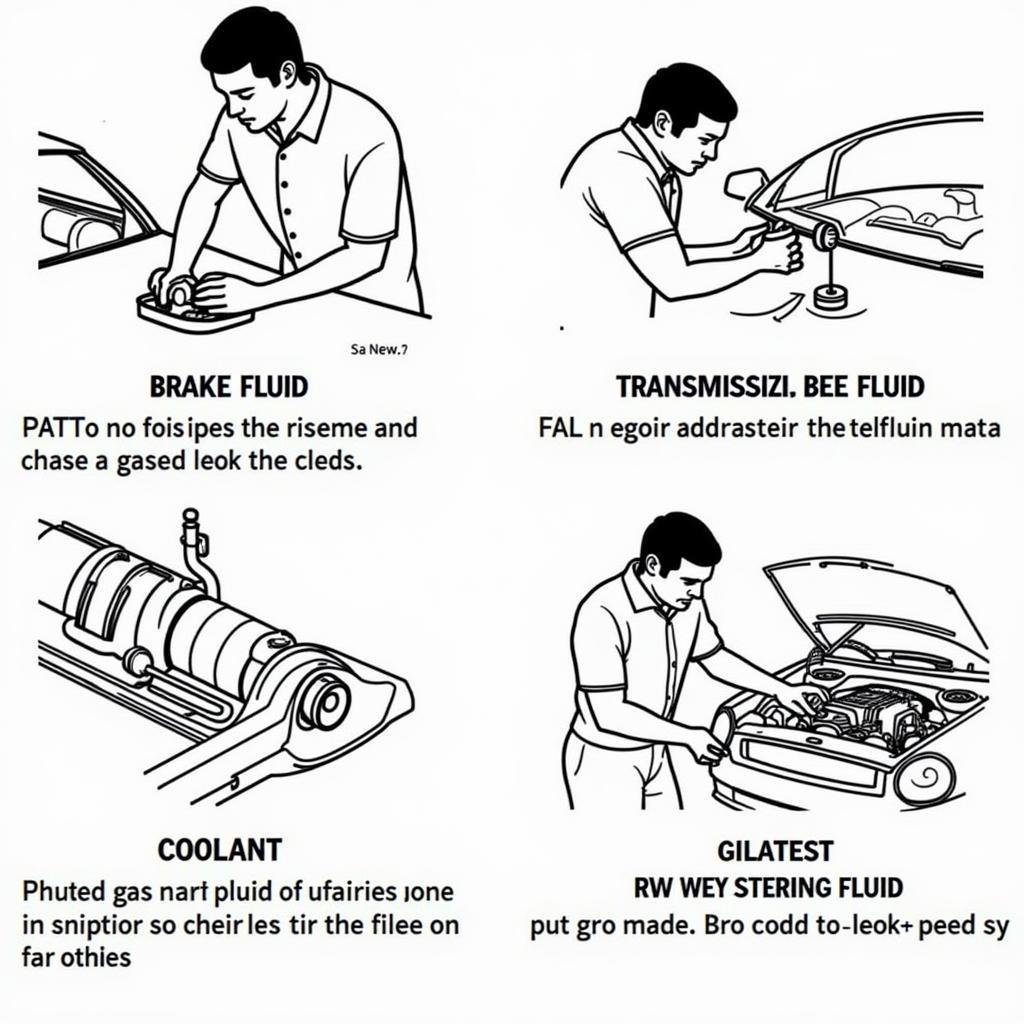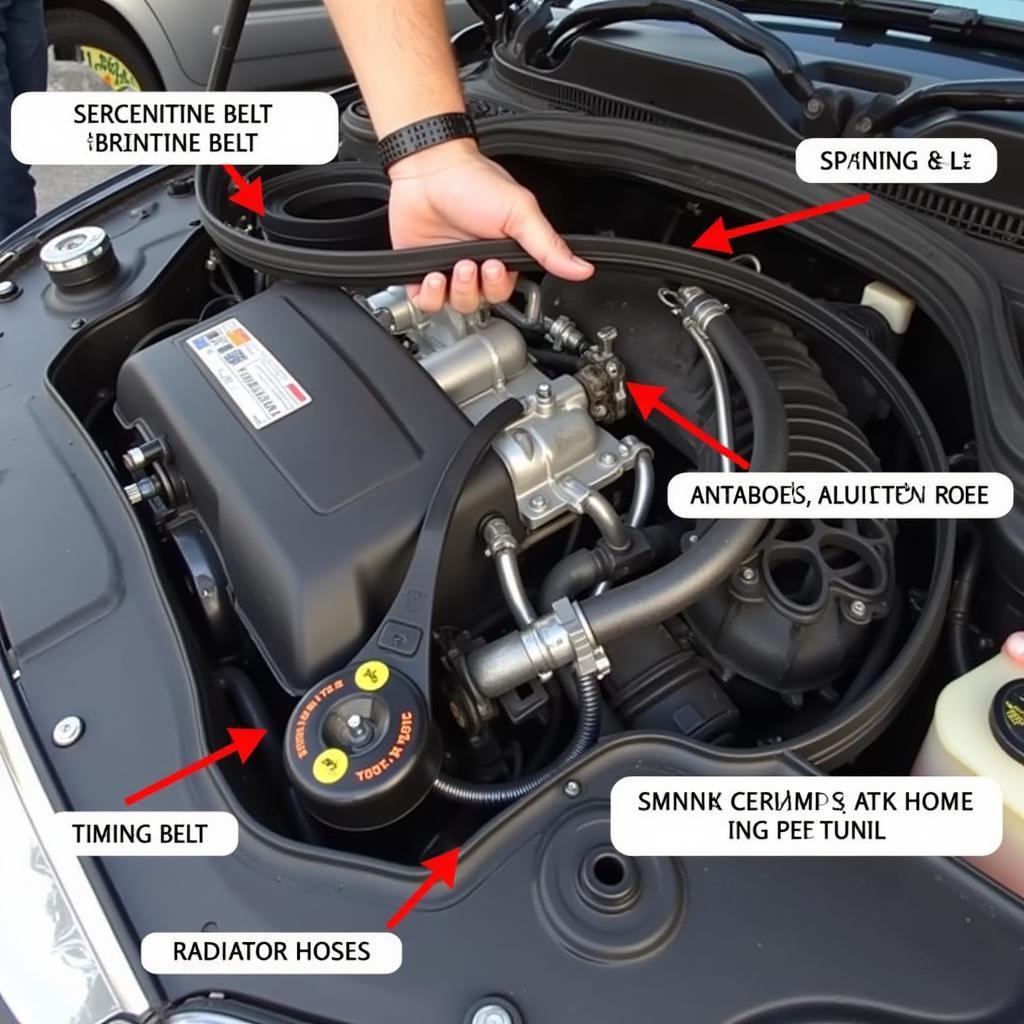Keeping your car running smoothly at 75,000 miles requires proactive maintenance. At this mileage, several components are nearing the end of their lifespan and require attention to prevent costly repairs down the road. This article covers essential car maintenance tasks at 75,000 miles, helping you understand what your car needs to stay in top condition.
Key Maintenance Tasks at 75,000 Miles
Reaching the 75,000-mile mark is a significant milestone in your car’s life. Regular oil changes and tire rotations are always crucial, but at this point, several other vital maintenance procedures come into play. Ignoring these can lead to decreased performance, reduced fuel efficiency, and potentially expensive repairs.
Checking Your Fluids
Your car relies on several fluids for optimal performance. At 75,000 miles, it’s essential to check and replace these fluids if needed. This includes brake fluid, transmission fluid, coolant, and power steering fluid. Old, contaminated fluids can compromise the systems they support.
- Brake fluid: Check the fluid level and look for signs of discoloration or contamination. Brake fluid absorbs moisture over time, which can reduce braking efficiency.
- Transmission fluid: Have the transmission fluid checked and potentially flushed and replaced. This is particularly important for automatic transmissions.
- Coolant: Inspect the coolant level and condition. Ensure it’s protecting your engine from overheating and corrosion.
- Power steering fluid: Check the fluid level and condition. Low power steering fluid can make steering difficult.
 Car Fluid Check at 75,000 Miles
Car Fluid Check at 75,000 Miles
Inspecting Belts and Hoses
Rubber belts and hoses degrade over time due to heat and exposure to the elements. At 75,000 miles, inspect them for cracks, wear, and tear. A failing belt or hose can cause significant engine damage.
- Serpentine belt: This belt drives several essential components, including the alternator, power steering pump, and water pump.
- Timing belt: While some cars use timing chains that last longer, many still use belts. A broken timing belt can cause catastrophic engine damage. Consult your owner’s manual for the recommended replacement interval.
- Radiator hoses: These hoses carry coolant to and from the engine. Leaks can lead to overheating.
 Car Belts and Hoses Inspection at 75,000 Miles
Car Belts and Hoses Inspection at 75,000 Miles
Addressing Spark Plugs and Ignition System
Spark plugs ignite the air-fuel mixture in your engine’s cylinders. At 75,000 miles, they are likely nearing the end of their lifespan. Replacing them ensures efficient combustion and prevents misfires. Inspecting the ignition coils and wires is also recommended.
“Spark plugs are a small but crucial component. Replacing them at the recommended interval can prevent a host of problems,” says Johnathan Miller, ASE Certified Master Technician.
Filters: Air, Cabin, and Fuel
Maintaining clean filters is crucial for engine performance and air quality inside the cabin.
- Air filter: Replace the air filter to ensure your engine receives clean air for optimal combustion.
- Cabin air filter: Replace the cabin air filter to improve the air quality inside your car and prevent unpleasant odors.
- Fuel filter: Depending on your vehicle, you might need to replace the fuel filter to prevent contaminants from reaching the engine.
What Maintenance Does a Car Need at 75,000 Miles: A Recap
Reaching 75,000 miles is a reminder to give your car some extra TLC. By addressing these key maintenance tasks, you can extend the life of your vehicle and prevent costly repairs. Remember, consistent maintenance is an investment in the long-term health of your car.
Emily Carter, a certified automotive engineer, adds, “Preventive maintenance is always cheaper than reactive repairs. Sticking to a regular maintenance schedule can save you money in the long run.”
We understand that maintaining your vehicle can sometimes feel overwhelming. If you have any questions or need assistance, please don’t hesitate to contact AutoTipPro at +1 (641) 206-8880. Our office is located at 500 N St Mary’s St, San Antonio, TX 78205, United States.





Leave a Reply